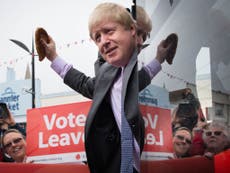If Vote Leave did break electoral laws, the consequences could be severe
The scale and variety of what went wrong in the summer of 2016 is in a different league from the usual rough and tumble of a British general election
As is often pointed out by Brexiteers, the 2016 referendum on EU membership generated the largest democratic mandate in British history – the 17.4 million people who voted to leave the European Union. However, it also seems that the referendum campaign has a claim to have been the dodgiest British election since the passage of the Great Reform Act in 1832.
The disclosure by representatives of the official Leave campaign, Vote Leave, of parts of the initial report of the Electoral Commission on their activities certainly gives cause for disquiet.
According to Vote Leave, resurrected for the purposes of defending its reputation, the Electoral Commission will claim, among other things, that the Leave group’s campaign made an inaccurate return of campaign expenditure, is missing invoices and receipts, failed to comply with a statutory notice and exceeded its spending limit. Most serious was the apparent belief on the part of the Electoral Commission that there was cooperation between Vote Leave and another campaign, BeLeave, aimed at younger voters. Whistleblowers who worked with BeLeave have publicly claimed as much.
For prominent members of the official Vote Leave group it could be embarrassing to have such charges levelled at them, though Vote Leave say that they offered to explain matters in person to the Electoral Commission and have compiled a dossier rebutting the supposed allegations. For Boris Johnson, Michael Gove, Gisela Stuart and others it can hardly be welcome news.
Not to be outdone, the second main Leave campaign group, Leave.EU, have had their own troubles with the Electoral Commission. This was the group fronted by Nigel Farage and Aaron Banks and which was fined £70,000 for breaches of electoral law in May. The group campaign chief, Liz Bilney, faces a police investigation and the commission said it had grounds to suspect she “knowingly or recklessly signed a false declaration” accompanying the Leave.EU referendum spending return. Such revelations should not come as a huge shock. In his book, the Bad Boys of Brexit, Mr Banks tells “tales of mischief, mayhem and guerrilla warfare in the EU referendum campaign”. Recently Mr Banks has, though, stoutly denied being some sort of evil genius with a long-haired white cat manipulating global politics.
The Remain campaign has also been investigated, fined and criticised by watchdogs. The Remain campaign, which of course had such heavyweight figures as David Cameron and George Osborne on board, was fined £1,000 last December and the Liberal Democrats were fined £18,000 for failing to provide a complete and accurate spending return.
All of that, then, without even pausing to consider the notorious poster campaigns, the claims about the £350m a week being sent to Brussels which could be spent on the NHS, the suggestion that Turkey was about to join the EU, Project Fear and the predictions that the UK economy would crash the day after a Leave vote. There were errors of omission and commission or worse, on both sides of the European argument.
All’s fair in love, war and referendum campaigns, it might be said, but the scale and variety of what went wrong in the summer of 2016 is in a different league from the usual rough and tumble of a British general election. The question arises as to whether such irregularities, exaggerated claims and fearmongering – on both sides – that we know about and others that are rumoured, were so grievous as to render the result unsafe. That is a much higher hurdle than findings about missing receipts, for example.
It is also a judgment that cannot be made by the Electoral Commission, nor even by Professor Sir John Curtice, who the nation turns to for guidance at such moments. It is matter for broad judgement by the electorate. It does not, in and of itself, make the case for a “final” referendum, even it was a dirty fight on both sides. It does, though, suggest that the Electoral Commission may have more to do in the coming months and will find itself assailed by critics from all sides as it follows the evidence.
So far it has shown admirable impartiality and diligence and it deserves to be supported and encouraged in finding out what exactly happened and why. Given that the UK leaves the EU, or least intends to, next March, it has little time to do so.



Join our commenting forum
Join thought-provoking conversations, follow other Independent readers and see their replies